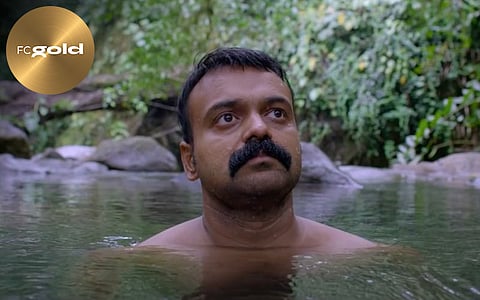
- Reviews
- Power List 2024
- Cannes 2024
- In-Depth Stories
- Web Stories
- News
- FC Lists
- Interviews
- Features
- FC SpecialsFC Specials

Director: Martin Prakkat
Cast: Kunchacko Boban, Joju George, Nimisha Sajayan
Nayattu, directed by Martin Prakkat and written by Shahi Kabir, begins with a scene that I read as a metaphor: a tug of war between two teams of men. In the middle of this, there's a smiling politician walking about the crowd, soliciting votes. This sets up what's going to follow because the film itself is a tug of war between what we conventionally call right and wrong. The politician is important, too, and signifies the by-elections round the corner.
We have a cop called Maniyan (Joju George). He helps frame a case against a boy who is caught with a girl whose father is a minister. Why he does this is obvious: because his higher up asked him to do it and also because he's a father of a young girl himself. He's proud of her and the thought that his daughter shouldn't end up in a similar situation probably influences him. So, Maniyan frames the boy with a false case, with the rest of the film being about how karma comes back to bite.
There are two other cops in the film—Praveen (Kunchacko Boban) and Sunitha (Nimisha Sajayan). You get the feeling — at first — that there may be a romantic angle. She gets into his jeep, he's looking at her in the rear view mirror, they steal glances at each other at a wedding. You think a romance is developing. But Nayattu is not that kind of a film at all and we are suddenly thrust into Hitchcockian territory. One of Hitchcock's favorite themes was an innocent man on the run. The director and writer do a number of interesting things with this thriller template.
Usually, cops chase bad guys, but that's not the case here. Also thrillers are usually nail-biters, and this is one too. A certain event has to happen before the voting day of a by-election. But, apart from that, each character has a problem that they have to solve immediately: Praveen has to take his mother to hospital, Nimisha has to finish construction in her house, Joju George has to make sure he attends his daughter's performance. But in the middle of all these, it's also the kind of film where people stop to have chai or buy a pack of sanitary pads. Another beautiful subversion is that unlike the usual, glossy thrillers, Nayattu is very rooted. It's rooted in the elections, the Dalit vote, and the youth that refuse to bow down to cops. There's also a subtext running throughout the film about the lives of cops: how this set of cops are perceived, what they think about their work, and how the public sees them.
One of my favorite scenes in the film takes place in a cannabis forest where two sets of locals are fighting for water. A third person asks why they don't just call a cop. They reply that cops will ask for witnesses—all they want is water.
Joju George is especially fantastic and rules the film. Nayattu is an object lesson on how to take a thriller template and subvert it, leaving the audience thinking that they've watched a hard-hitting social drama.